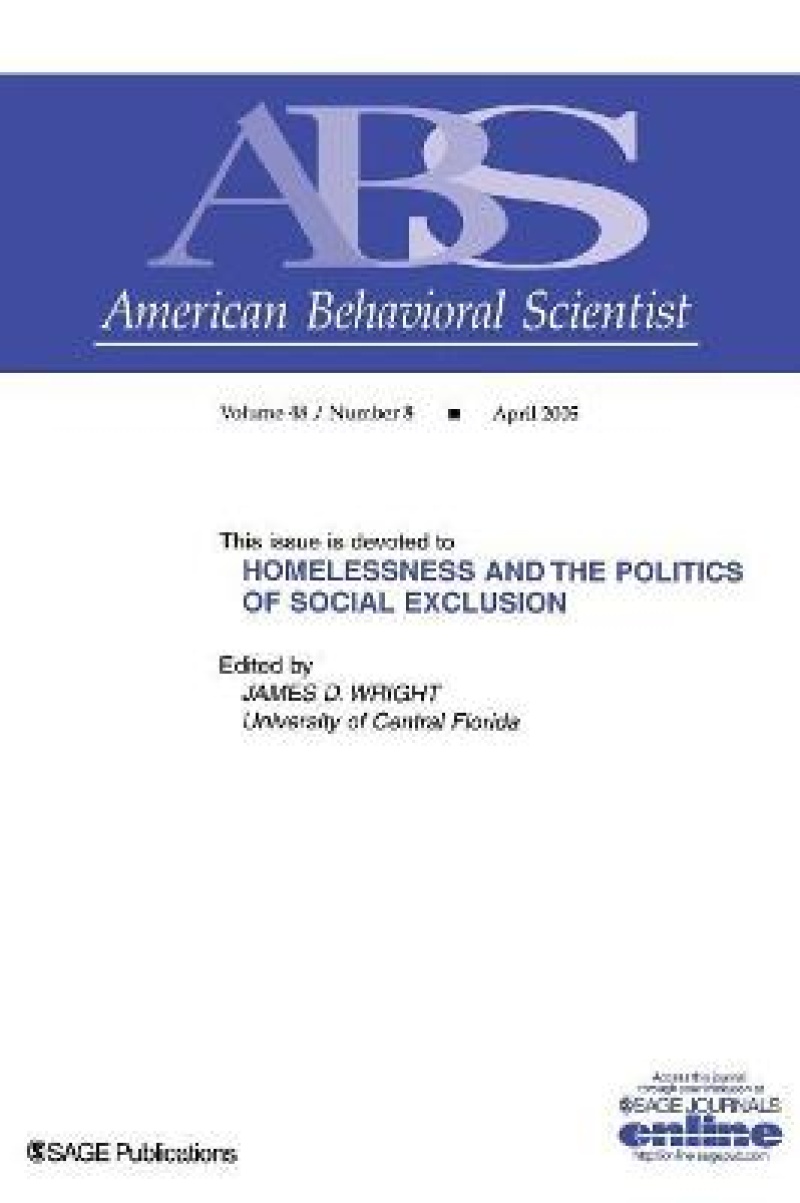"Homelessness is not one problem, but many different kinds of problems involving many different kinds of people, each of them homeless for different reasons or who have become homeless in different ways… Among the homeless of today are men, women, children, and whole families; victims of domestic violence and male abandonment; young, middle-aged, and elderly; veterans; illegal immigrants; persons of every ethnic description; people who are homeless for strictly economic reasons; others who are homeless because they drink and drug too much; the lucid and the deranged; and on through a long list…." James Wright University of Central Florida Bringing together international perspectives from sociology, political science, public policy, criminology, urban studies, adolescent research, and social work, this fascinating April 2005 issue of American Behavioral Scientist (ABS), entitled Homelessness and the Politics of Social Exclusion focuses on pioneering research about how the homeless are marginalized in societies around the world and the consequences of this social exclusion. Based on presentations at the American Sociological Association′s 2003 Annual Meeting, the authors of this unique volume discuss: Why the characteristics of both Los Angeles and Berlin homeless populations are similar despite different welfare systems and public policies (von Mahs) How staff create, sustain, and escalate conflict in a drop-in center for street kids (Joniak) Structural changes in Japanese society and the recent growth of homelessness (Hasegawa) The risks and conditions of semipermanent makeshift housing such as RVs (Wakin) Whether the presence of homeless persons near or in residential areas is a mark of encroaching urban disorder that undermines neighborhood quality and engenders fear among neighborhood residents (Farrell) Marginality and criminal victimization among homeless people (Lee and Schreck) The complex relationships between homeless women and their intimate partners (Wesley and Wright) How peer networks affect substance abuse among newly homeless adolescents (Rice, Milburn, Rotherham-Borus, Mallett, and Rosenthal) Negotiating rules, power and social control within an emergency youth shelter (Armaline) Whether the original cause of a person′s homelessness is economic, social, cultural or political, homelessness carries a stigma This absorbing issue of American Behavioral Scientist offers new ways of observing this global social problem and should be included in every sociology, social work, and political science library!
Les mer
Introduction: Homelessness and the Politics of Social Exclusion - James D. Wright
The Sociospatial Exclusion of Single Homeless People in Berlin and Los Angeles - Jürgen von Mahs
Exclusionary Practices and the Delegitimization of Client Voice: How Staff Create, Sustain, and Escalate Conflict in a Drop-In Center for Street Kids - Elizabeth A. Joniak
Economic Globalization and Homelessness in Japan - Miki Hasegawa
Not Sheltered, Not Homeless: RVs as Makeshifts - Michele Wakin
Sharing Neighborhoods: Order and Disorder in Homeless-Domiciled Encounters - Chad R. Farrell
Danger on the Streets: Marginality and Victimization Among Homeless People - Barrett A. Lee and Christopher J. Schreck
The Pertinence of Partners: Examining Intersections Between Women’s Homelessness and Their Adult Relationships - Jennifer K. Wesely and James D. Wright
The Effects of Peer Group Network Properties on Drug Use Among Homeless Youth - Eric Rice, Norweeta G. Milburn, Mary Jane Rotheram-Borus, Shelley Mallett, and Doreen Rosenthal
"Kids Need Structure": Negotiating Rules, Power, and Social Control in an Emergency Youth Shelter - William T. Armaline
Les mer
Produktdetaljer
ISBN
9781412938075
Publisert
2005-03-20
Utgiver
Vendor
SAGE Publications Inc
Vekt
310 gr
Aldersnivå
P, 06
Språk
Product language
Engelsk
Format
Product format
Heftet
Antall sider
226
Redaktør
